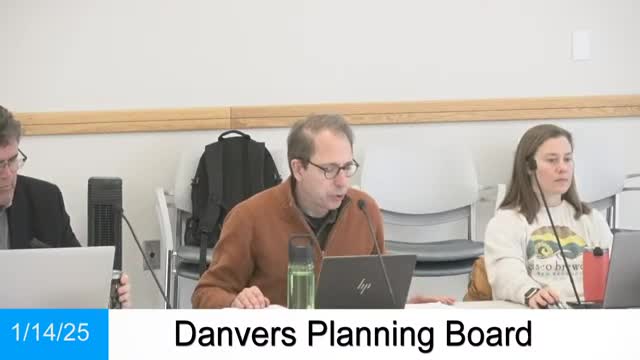Danvers planning board orders limited peer review after town counsel says 1972 Trask Lane covenant likely expired
Get AI-powered insights, summaries, and transcripts
Subscribe
Summary
The board voted Jan. 14 to commission a third‑party peer review limited to two Danvers intersections after town counsel concluded a 1972 restrictive covenant likely expired; the applicant agreed to pay if the scope is kept small. The matter was continued to Jan. 28.
Danvers Planning Board members voted Jan. 14 to commission a third‑party peer review of traffic impacts tied to the proposed Corcoran development, limiting the review to two Danvers intersections after town counsel concluded a 1972 restrictive covenant tied to Trask Lane likely expired.
The vote directs a peer review limited to the intersections of Trask Lane with Wayside Drive and Trask Lane with Folly Hill Drive. Jim Sears moved the motion and Jean Hartnett seconded; the board voted in favor with no recorded opposition. The board also continued the matter to its Jan. 28 meeting for follow‑up after the review.
Town counsel’s representative, Ethe Singer, reading a memorandum from Town Counsel Dave DeLuca, told the board that restrictive covenants of the kind recorded in 1972 typically expire after 30 years if no extensions are recorded. "In this case . . . the covenant likely expired in 2002," Singer said, adding that limited exceptions exist but are speculative. That legal view narrowed the planning board’s formal authority under the covenant to traffic‑safety review only if the covenant remained enforceable.
The applicant, represented by attorney Miranda Semasco of Glovsky & Glovsky and by project team members including Peter Mahoney, told the board it would cooperate. Semasco said the applicant had proposed reducing the scope of inquiry to the two Danvers intersections because other intersections identified in the project traffic study fall within MassDOT jurisdiction and will be examined as part of the state review under the Massachusetts Environmental Policy Act (MEPA). Rebecca Brown, the project traffic consultant from Greenman Peterson, confirmed the intersections along Elliott Street and the Route 128 ramps are under MassDOT jurisdiction.
Semasco told the board the developer would pay for a limited peer review provided the scope did not expand: "If the peer review is limited, as we've suggested, and we can all agree on that, they will pay for that, provided that scope does not expand." The town staff reported the town already holds funds from the applicant and can begin the process once the scope is agreed.
Board members and town counsel discussed what authority the covenant, if enforceable, would have granted the board. The covenant language referred to a 554‑unit threshold and limited the planning board’s approval power to "consideration of traffic safety on ways within its jurisdiction" (paragraphs 13–14 of the 1972 instrument). Town counsel said the covenant’s plain language did not identify specific intersections; the board could review traffic safety for Danvers public ways within its jurisdiction if the covenant were still binding.
Project team members and town counsel also reviewed the state permitting timeline. A project representative said the developer submitted a draft environmental impact report under MEPA and that MassDOT will review highway access because of proximity to Route 128; the MEPA public comment period runs through February (DEIR filing and comment deadlines were discussed at the meeting; town staff offered to provide links for public comment).
Several members of the public raised traffic and quality‑of‑life concerns. Town Meeting member Joanne Wielakwaguchi urged Danvers to press Beverly to reconsider alternative access options that would not route additional traffic onto Danvers streets. The board’s staff summarized three written public comments received, including a letter from Tom McDonald that warned of increased congestion and safety risks.
Next steps: staff said it will draft a reduced peer‑review scope for the board to approve, secure a third‑party reviewer, and return the reviewer’s report to the board. The board will consider any release (partial or full) of the covenant only after town counsel reviews outstanding legal issues and the peer review is completed. The public hearing/continuation was set for Jan. 28, 2025.
